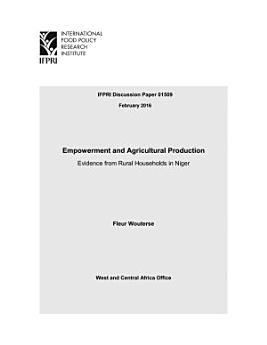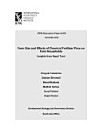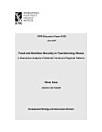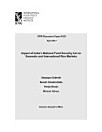Empowerment and agricultural production
Wouterse, Fleur Stephanie
2016年2月 · IFPRI Discussion Paper 1 巻 · Intl Food Policy Res Inst
電子書籍
28
ページ
family_home
利用可能
info
report評価とレビューは確認済みではありません 詳細
この電子書籍について
Niger is a landlocked Sahelian country, two-thirds of which is in the Sahara desert, with only one-eighth of the land considered arable. Nevertheless, more than 90 percent of Niger’s labor force is employed in agriculture, which is predominantly subsistence oriented. Since the great famines of the 1970s and 1980s, the country has pursued agrarian intensification through technological change to address challenges to the food security situation. However, this approach has failed to recognize that the main characteristic of the Sahelian part of West Africa is the intricate complexity of the social, environmental, and economic dimensions that differentially affect male and female rural dwellers. One example is the patrilineal tenure system, which under increased population pressure has led to the exclusion of women and youth from agriculture in some areas. The Women’s Empowerment in Agriculture Index (WEAI) indicates that access to land is one important dimension of empowerment. In order to assess the role of empowerment in agricultural production, we use new household- and individual-level WEAI data from Niger and regression analysis. Our results show that empowerment is important for agricultural production and that households in which adult individuals are more empowered are more productive. This means that other and possibly more effective pathways to agrarian intensification exist and important agricultural productivity gains could be made by empowering men and women in rural households.
この電子書籍を評価する
ご感想をお聞かせください。
読書情報
スマートフォンとタブレット
Android や iPad / iPhone 用の Google Play ブックス アプリをインストールしてください。このアプリがアカウントと自動的に同期するため、どこでもオンラインやオフラインで読むことができます。
ノートパソコンとデスクトップ パソコン
Google Play で購入したオーディブックは、パソコンのウェブブラウザで再生できます。
電子書籍リーダーなどのデバイス
Kobo 電子書籍リーダーなどの E Ink デバイスで読むには、ファイルをダウンロードしてデバイスに転送する必要があります。サポートされている電子書籍リーダーにファイルを転送する方法について詳しくは、ヘルプセンターをご覧ください。










